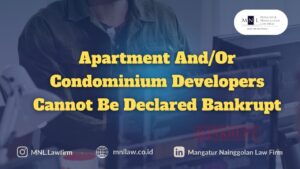
APARTMENT AND/OR CONDOMINIUM DEVELOPERS CANNOT BE DECLARED BANKRUPT
One of the most frightening “nightmares” for users or buyers of apartments/condominiums is the bankruptcy of the developer. When a developer is declared bankrupt, the fulfillment of users’ rights to receive their units and obtain proof of ownership (certificates) is neglected. Land and/or units that have been or have not yet been completed become part of the bankruptcy estate. The bankruptcy trustee conducts the sale of the bankruptcy estate. Users may register as concurrent creditors. The proceeds from the sale of the estate are not immediately distributed to the users but are used as collateral for all creditors and distributed proportionally (pari passu pro rata parte). However, this proportional distribution is subject to priority payments to creditors with preferential rights or those prioritized by law (Preferential Creditors). As a result, users’ rights to recover their funds are marginalized.
What is Bankruptcy?
Article 1(1) of Law No. 37 of 2004 on Bankruptcy and Debt Payment Moratorium (“Law 37/2004”) defines bankruptcy as a general seizure of all assets of the bankrupt debtor, the administration and settlement of which are carried out by a curator under the supervision of a supervising judge.
When an individual or legal entity is declared bankrupt, they lose their right to control and manage their assets included in the bankruptcy estate as of the date the bankruptcy declaration is issued (see Article 24(1) of Law 37/2004). The administration and/or liquidation of the bankruptcy estate is the responsibility of the trustee appointed by the court (see Article 16(1) of Law No. 37 of 2004).
Conditions for Bankruptcy
The conditions for declaring bankruptcy are the existence of two or more creditors and the failure to fully pay at least one debt that has matured and is enforceable, with the bankruptcy being declared by a court decision, either upon the debtor’s own application or upon the application of one or more of its creditors (see Article 2(1) of Law No. 37 of 2004).
More technically, the conditions for filing for bankruptcy as mentioned above must be based on facts or circumstances that are proven in a simple manner (see Article 8(4) of Law No. 37 of 2004). The term “facts or circumstances that have been proven in a simple manner” refers to the existence of two or more creditors and the fact that the debt has matured and remains unpaid. The significant difference in the amount of debt claimed by the petitioner and the respondent does not prevent the issuance of a bankruptcy declaration.
Developers Cannot Be Declared Bankrupt
Supreme Court Circular Letter No. 3 of 2023 on the Implementation of the Results of the Plenary Meeting of the Supreme Court Chamber in 2023 as a Guide for the Performance of Duties by Courts (“SEMA 3/2023”) interprets the procedures for proving bankruptcy as regulated in Article 7 Paragraph (4) of Law No. 37 of 2004. The Supreme Court states that a petition for bankruptcy or PKPU against an apartment and/or housing complex developer does not meet the requirements for simple proof.
The legal consequences of the implementation of SEMA 3/2023 appear to protect users. However, upon further examination, the SEMA also regulates the Suspension of Debt Payment Obligations (PKPU). As a result, in cases of stalled construction, neither the developer nor the user can utilize the PKPU mechanism. Theoretically, the PKPU is a mechanism for debt restructuring.
Conclusion
Supreme Court Circular Letter No. 3 of 2023 on the Implementation of the Results of the Plenary Meeting of the Supreme Court Chamber in 2023 as a Guide for the Performance of Duties by the Court (“SEMA 3/2023”) states that a petition for bankruptcy or PKPU against a developer (developers) of apartments and/or residential buildings do not meet the criteria for simple proof and therefore do not meet the criteria for being declared bankrupt.
Legal Basis
Law No. 37 of 2004 on Bankruptcy and Debt Payment Moratorium.
Supreme Court Circular Letter No. 3 of 2023 on the Implementation of the Results of the Plenary Session of the Supreme Court Chamber in 2023 as Guidelines for the Performance of Duties by the Courts.
Author: Evi Mutiara Marpaung
Editor: Muhammad Arief Ramadhan, S.H.
